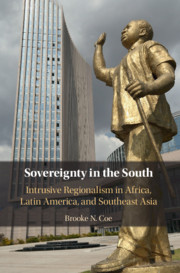Book contents
- Sovereignty in the South
- Sovereignty in the South
- Copyright page
- Contents
- Figures
- Tables
- Acknowledgments
- Acronyms
- Introduction
- 1 The Uneven Rise of Intrusive Regionalism
- 2 Macronationalism and the Discursive Foundations of Regionalism in the Global South
- 3 Contested Sovereignty Norms and the Erosion of Non-interference
- 4 The Role of Regime Type
- 5 The Role of Economic Performance
- Conclusion
- Bibliography
- Index
5 - The Role of Economic Performance
Published online by Cambridge University Press: 19 October 2019
- Sovereignty in the South
- Sovereignty in the South
- Copyright page
- Contents
- Figures
- Tables
- Acknowledgments
- Acronyms
- Introduction
- 1 The Uneven Rise of Intrusive Regionalism
- 2 Macronationalism and the Discursive Foundations of Regionalism in the Global South
- 3 Contested Sovereignty Norms and the Erosion of Non-interference
- 4 The Role of Regime Type
- 5 The Role of Economic Performance
- Conclusion
- Bibliography
- Index
Summary
This chapter addresses a puzzle set up in Chapter 5: Why did Africa become so much more intrusive than Southeast Asia in the post–Cold War period, given that neither region experienced widespread democratization? A partial explanation for this variation in outcomes is that Africa’s normative priors were different – by the time these regions arrived at the 1980s, the norm of non-interference had already eroded to a greater extent in Africa than Southeast Asia. In this chapter, I make the case for another more proximate factor – economic performance. Poor economic performance renders states materially and socially vulnerable and creates legitimacy deficits, and these vulnerabilities make states more open to normative and institutional reform. In Africa, reform took the form of more intrusive regional norms and institutions. Southeast Asia’s stellar economic performance prior to the 1997 financial crisis served to reaffirm and reinforce its norm set – including non-interference. The crisis prompted some reform (and some erosion of non-interference) but not to the same degree as in Africa.
- Type
- Chapter
- Information
- Sovereignty in the SouthIntrusive Regionalism in Africa, Latin America, and Southeast Asia, pp. 143 - 183Publisher: Cambridge University PressPrint publication year: 2019



